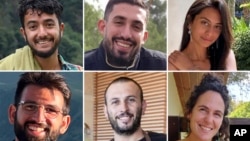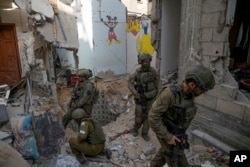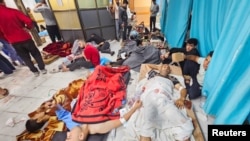The presence of Israeli troops inadvertently contributed to the deaths in August of six hostages held in Gaza, according to the results of an investigation by the Israeli military released Tuesday.
The six hostages, including Israeli American Hersh Goldberg-Polin, were taken by Hamas militants during the October 7, 2023, raid on Israel. They were killed by Hamas after nearly 330 days in captivity.
The military's report found that "ground activities in the area, although gradual and cautious, had a circumstantial influence on the terrorists' decision" to kill the six hostages.
Their bodies were found 48 to 72 hours later in a tunnel in late August, the report said.
The military was operating in that area of southern Gaza because the likelihood that hostages were there was considered medium to low, the report said.
"The investigation published tonight proves once again that the return of all hostages will only be possible through a deal," the Hostages and Missing Families Forum said in a statement on Tuesday.
Gaza hospital evacuation
The Israeli military forced the evacuation of the Indonesian Hospital in northern Gaza, and many patients, some of them on foot, arrived at another hospital miles away in Gaza City, the enclave's health ministry said Tuesday.
The Indonesian Hospital is one of the few still partially functioning hospitals left in Gaza, on its northern edge, which has been under intense Israeli military pressure for almost three months.
Israel says its operation around the three northern Gaza communities surrounding the hospital is targeting Hamas militants. But Palestinians accuse Israel of trying to create a buffer zone by depopulating northern Gaza. Israel denies that accusation.
Meanwhile, in other parts of Gaza, Israeli bombardments killed at least nine Palestinians in four separate military strikes on Tuesday, according to medics.
And in the Israeli-occupied West Bank, Israeli forces killed at least eight Palestinians in an early morning raid on Tuesday on a refugee camp near the city of Tulkarm, according to Palestinian and Israeli officials.
The Israeli military said it opened fire after its soldiers were fired upon. It said some uninvolved civilians were harmed. Israel has carried out several raids on the West Bank during the Gaza war, killing 800 Palestinians since October 2023, according to Palestinian health authorities.
Another ongoing problem in Gaza is the food supply. Israel has failed to crack down on armed gangs attacking food convoys in the enclave, despite a pledge to do so in mid-October to help prevent famine in the territory, Reuters reported. It cited three United Nations and U.S. officials familiar with the matter.
The commitment was made behind closed doors but appeared to be a major development because Israel had been reluctant to improve the severe humanitarian crisis in Gaza since the war broke out more than a year ago.
An Israeli military spokesperson declined to comment to Reuters about what was agreed upon in October and what was being done to prevent looting.
"Israel has taken significant steps to allow the maximum possible scope of aid to Gaza," the spokesperson said.
Earlier on Tuesday, Israel's military said it intercepted a missile that was launched from Yemen.
The missile prompted air sirens but was destroyed before entering Israeli territory, the military said.
The Yemen-based Houthi militants have fired scores of missiles at Israel since Hamas launched its attack on Israel in October 2023, sparking the war in the Gaza Strip.
Israel's response has included airstrikes on Houthi targets, and on Monday, Israeli Defense Minister Israel Katz warned that Houthi leaders would face the same fate as the leaders from Hamas and the Lebanon-based Hezbollah militant group who were killed in Israeli strikes.
Hamas, Hezbollah and the Houthis are all backed by Iran, and all have been designated as terror groups by the United States and others.
Katz on Monday confirmed Israel was responsible for the August explosion in Tehran that killed Hamas political leader Ismail Haniyeh. Israel was widely believed to have been behind the attack, but Monday's comments appeared to be Israel's first public acknowledgment.
Israeli forces killed a number of Hezbollah leaders in recent months amid intensified fighting in southern and eastern Lebanon. That conflict has cooled with a month-old ceasefire, while negotiators including Egypt, the United States and Qatar have been working to try to achieve an elusive halt in fighting in Gaza.
Israeli Prime Minister Benjamin Netanyahu said in a speech Monday in the Knesset that there has been "some progress" in the ongoing negotiations to secure the release of Israeli hostages held in Gaza.
"Everything we are doing cannot be disclosed," Netanyahu said. "I wish to say cautiously that there has been some progress, and we will not stop acting until we bring them all home."
Hamas militants killed 1,200 people in their October 7, 2023, terror attack on southern Israel and took about 250 others hostage. There are still around 100 hostages still being held in Gaza, though at least one-third are believed to be dead.
Israel's counteroffensive in Gaza has killed more than 45,300 people, according to the Gaza health ministry. The ministry does not differentiate between civilians and fighters in its count.
Netanyahu also said Monday that he wants to sign new peace agreements with Arab countries, similar to the 2020 Abraham Accords negotiated by the U.S. for Israel and several Arab countries.
"Moderate Arab countries view Israel as a regional power and a potential ally," Netanyahu said. "I intend to seize this opportunity to the fullest."
Some information for this story came from The Associated Press, Agence France-Presse and Reuters.







